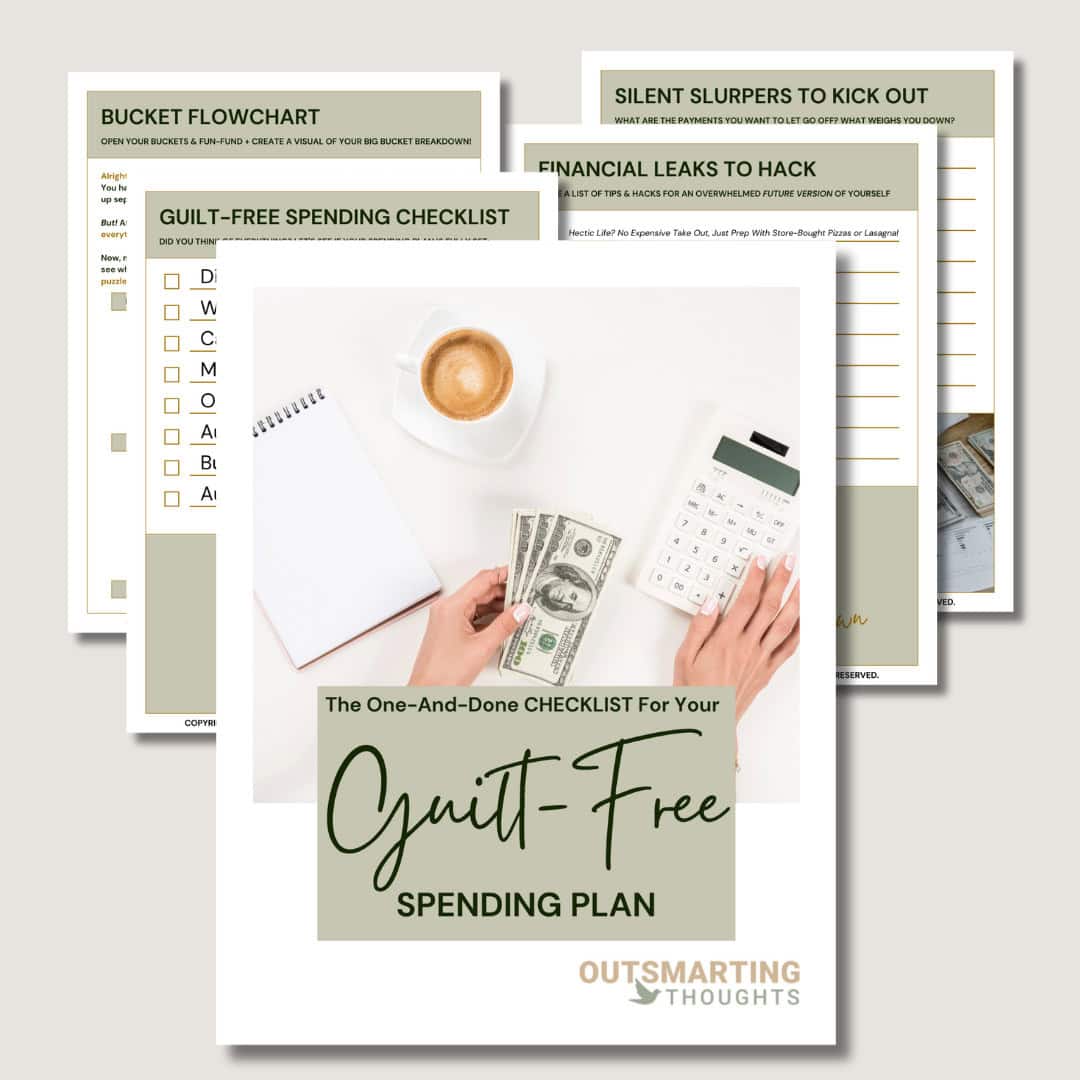Wanna know why impulse buying keeps wrecking your budget even when you swear you’re done with it? This post is dedicated to exposing the truth behind your slip-ups and showing you how to deal with them without the shame spiral.
You know that sickening mix of regret and frustration after buying something you didn’t plan for? It’s brutal, and it feels like you’re the problem. But can I shake you awake a little right now? You’re not the problem! Honestly! You’re living in a culture designed to hook you, tempt you, and then leave you blaming yourself when you trip. And that guilt-ridden cycle is what keeps you stuck.
What you’re going to learn is how to stop treating impulse buying like a personal failure and instead approach it with care, strategy, and kick-ass rebellion. You’ll see how financial denial plays into the chaos, how self-punishment keeps you trapped, and why shifting toward intentional spending is the only way to get truly free.
After you have learned to treat your impulses as signals rather than sins, you’ll be able to set goals, design functional systems, and forgive yourself when you slip. That’s when you’ll feel more empowered, more in control, and more aligned with the life you want to build.
This post is all about impulse buying, so you can stop the shame cycle and start using your money in a way that feels powerful and freeing.
Impulse Buying
Impulse buying gets a bad rap because people confuse doing something bad with being bad. That mix-up alone makes you scapegoat yourself when you’re already hurtin. But the truth is, you live in a culture engineered to trip you into spending. Ads, discounts, and social proof are built to override your brain’s rational filters. And when you inevitably fall for it? You label yourself the problem.
What it truly is about is realizing that guilt, shame, and punishment will never fix overspending. They only deepen the mess by keeping you in fight-or-flight mode, where rational thinking is impossible. Once you restore your innocence and recognize you’re a normal, decent, feeling human being living in a consumer circus, you can start using strategy. With the right goals, environment, and intentional spending plan, you’ll see impulse buying lose its grip on you. And that? That’s where freedom starts.
Face the Real Tug-of-War
The first step in breaking free from impulse buying is admitting that you don’t actually have full control in the moment. Sounds harsh, but it’s the truth. The pull of consumer culture is strong, and pretending you’re immune is what traps you in the denial loop. This is where financial denial sneaks in. You tell yourself it’s not that bad, or you’ll make up for it later, or you’ll be more disciplined next time. That denial isn’t harmless; it keeps you blind to the actual problem.
RELATED POST:
How To Pull Yourself Out Of Financial Denial: An Overachiever’s Strategy To Get Back In Control
When you stop sugarcoating and admit, I don’t have full control here yet, you give yourself room to step out of the guilt and into strategy. Think of it like trying to drive on ice. If you deny that the ice is slippery, you’ll skid. If you admit the ice exists, you can adjust your steering accordingly.
Contrary to popular belief, this isn’t about weakness. In fact, it’s about awareness. Overachievers especially hate the idea of being out of control, but counterintuitively, that admission is what puts you back in the driver’s seat. Because seriously, you can’t fix what you refuse to see!
So the next time you feel that urge to buy, don’t immediately judge yourself. Pause & analyze. Recognize that this is the tug-of-war between consumer manipulation and your long-term goals. When you acknowledge it openly, you can start planning your moves like a strategist instead of punishing yourself like a failure.
Care Beats Punishment, Every Time
Let’s not sugarcoat it: punishing yourself for impulse buying is like trying to put out a fire with gasoline. The more you shame and scold yourself, the more trapped you feel. And trapped people don’t make strategic choices; they just grab for relief, which usually means more spending. It’s a vicious cycle, depending on your amount of self-judgment.
What I would like you to consider is that your so-called bad behavior is actually a signal, and not a crime. When you buy impulsively, it’s your brain saying hey, I need relief, stimulation, or comfort. If you punish that need, you bury it. And honestly, how healthy is it to cut off an inherent need inside of you? This is WHY you should shift from punishment to care. Because! If you care about it, you learn from it.
Sorry for not sugarcoating, but the punishment cycle is toxic. It floods your body with stress hormones, keeps you in fight-or-flight, and literally blocks the part of your brain that could help you plan better next time. By caring instead of condemning, you unlock the chance to create healthier outlets and build resilience. And that’s where your real power lies.
Owning a cashflow strategy is a skill that’ll give you some serious advantages in life. I think budgeting is an aligned action with taking life seriously, and I seriously believe life will reward you for it. If you’re not into high-maintenance strategies like ‘tracking your spending’ and just want to sit down ONCE to direct your financial future, our Guilt-Free Spending Plan Printable is the right cashflow strategy for you! Don’t let anybody outsmart you out of your own money and start budgeting today by simply filling out the form below:

Want a free
ONE-AND-DONE CHECKLIST for aGUILT-FREE SPENDING PLAN? Free up your bandwidth and stop overthinking with this
FREE One-And-Done Checklist for your Guilt-Free Spending Plan!
Simply fill out the form below to get this strategy
delivered straight to your inbox!
Reclaim Control With Strategy
Now that you’ve stopped beating yourself up, it’s time to get back in control. This isn’t about forcing yourself to be a monk who never shops. It’s about setting up goals, strategies, and environments that make intentional spending possible.
In fact, intentional spending is your secret weapon here. The moment you switch from avoiding mistakes to building alignment, everything changes. Instead of thinking don’t spend on this, you start thinking I choose to spend on what resonates and skip what doesn’t. That shift makes control empowering, instead of restrictive.
RELATED POST:
Intentional Spending: The CEO-Mindset And AntiDote Against Overspending & Impulse Buying
Set a goal that excites you; a trip, a big project, a future you can see yourself stepping into. Then design a system that keeps those goals visible. Track your cashflow in a way that feels strategic, not tedious. And create an environment that helps you resist the nonsense: unfollow brands that trigger you, remove saved cards from shopping sites, and replace that dopamine hit with something rewarding that doesn’t sabotage your wallet.
Counterintuitively, this doesn’t shrink your life. In fact, it expands it. You start aligning your money with your actual values. You stop being prey for marketing masterminds. And you step into a version of yourself that feels powerful and deliberate, not reactive and ashamed. That’s the kind of control worth chasing.
Forgiveness Is the Real Flex
Unfortunately, there is no way out of this sad truth: you’ll have to do this cycle more than once. You’ll fall into impulse buying again, and again, and again. But what it truly is about is how you respond afterward. Will you punish, or will you care?
Science is clear on this. Self-punishment keeps you in fight-or-flight mode, which shuts down your prefrontal cortex; the part of your brain responsible for rational decision-making. Studies show that chronic self-criticism actually reinforces the very behaviors you’re trying to eliminate because your body craves relief from the stress. Forgiveness, on the other hand, activates the parts of your brain linked to learning and growth. It’s literally a biological advantage.
Think about it: would you scream at a kid for falling while learning to ride a bike? Of course not. You’d cheer them on, patch the scrape, and tell them to try again. That same principle applies to you. Care fuels progress. Punishment chains you to the same mistakes.
When you forgive yourself, you open the door to trying again with clear-headed rationality. You recognize the lesson, adjust the system, and move on stronger. And that’s how actual natural growth works. That’s how you outsmart the spiral and reclaim your full potential.
So the real flex isn’t never falling. It’s forgiving fast, caring harder, and refusing to half-ass life just because you slipped. That’s what turns a misstep into momentum.
Impulse Buying (Summary)
Impulse buying often gets twisted into a character flaw when in reality it’s a reaction to living in a culture built to tempt you. You confuse doing something bad with being bad, and that judgment sabotages your ability to actually change. What you need is care, not punishment.
The key strategies here are simple but powerful: admit when you’re not fully in control, stop punishing yourself, build intentional spending systems, and practice forgiveness when you slip. Each step helps you regain authority over your finances without falling into the shame spiral that marketing culture wants you trapped in.
Picture this: you’re no longer shackled by self-blame after every purchase. Instead, you treat slip-ups as signals, pivot with strategy, and align your money with your bigger goals. You feel freer, clearer, and more unstoppable in building the life you want.
I wish you the absolute best in breaking this cycle and stepping into your most powerful, strategic self. For what it’s worth, I believe in you! Go kick some ass; you’ve got this.
This post was all about impulse buying, so you can stop the shame cycle and start using your money in a way that feels powerful and freeing.
We aim to help you out as much as possible, but please keep in mind that the content is only for general informational and educational purposes. We offer our services based on independent research and life-experience only, and so our strategies can never serve as a substitute for professional advice. Trust me, we do not have 'everything figured out', are all still huge works in progress, but hey, what works for us, might work for you too! This is allll up for you to decide... It might not work for you, and that's okay, so cherrypick the stuff that resonates and leave the stuff that doesn't, and let's go!








